HND Hospitality Research: Digital Technologies in Crisis Management
VerifiedAdded on 2023/06/09
|13
|2691
|292
Report
AI Summary
This research project examines the integration of new digital technologies into crisis management within the UK hospitality industry, focusing on The Edinburgh Grand. The aim is to understand how technology can be leveraged to manage crises, particularly in the wake of COVID-19. The research objectives include developing a basic understanding of crisis management in the UK hospitality context, determining the issues of crisis management on business performance at The Edinburgh Grand, and establishing the relationship between integrating new digital technology and crisis management in the hospitality sector. The methodology employs a deductive approach with a positivist research philosophy, utilizing a survey research strategy and both quantitative and qualitative data collection methods, including questionnaires and secondary sources like books and journals. The study also addresses ethical considerations and includes a timeline for activities.
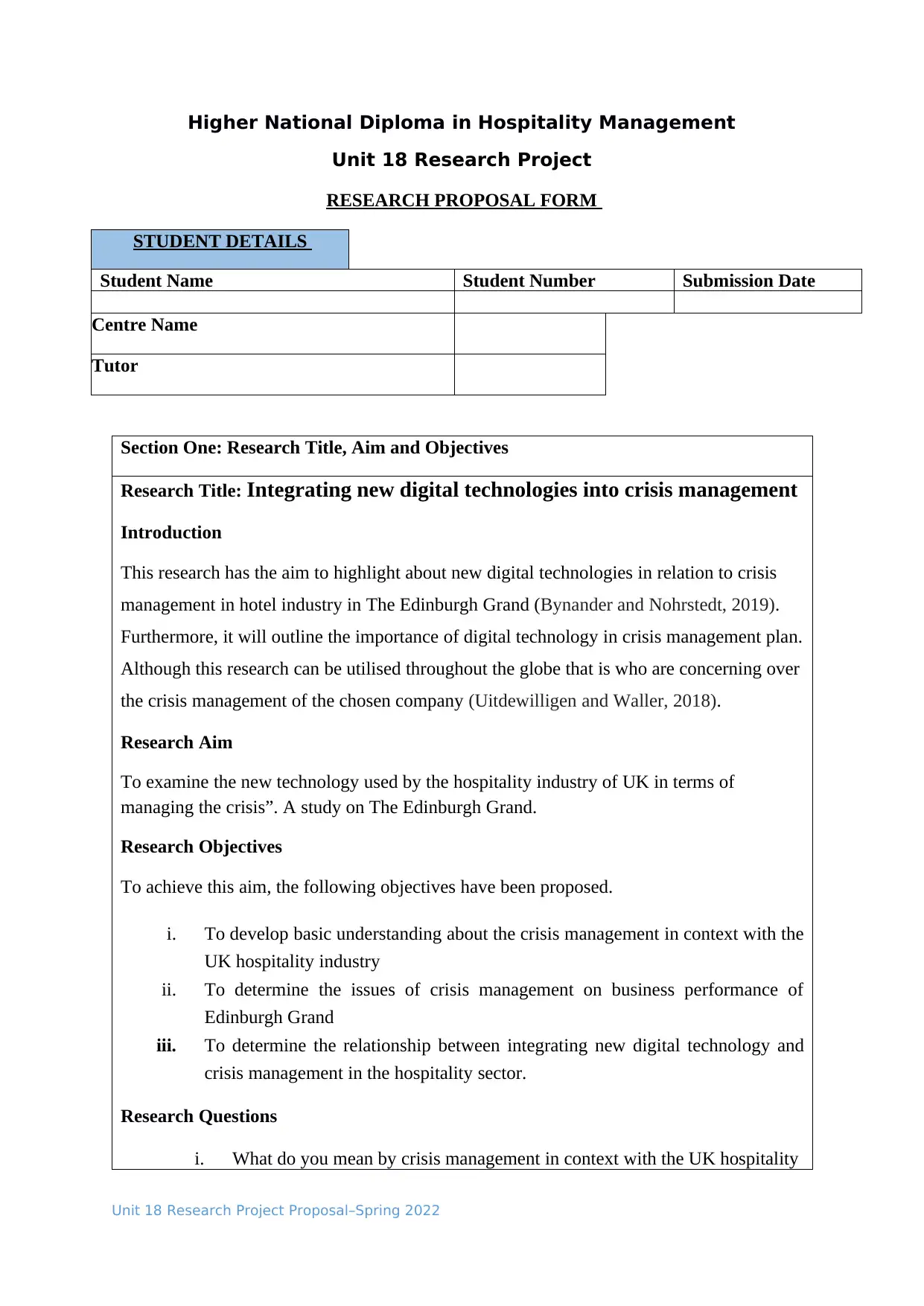
Higher National Diploma in Hospitality Management
Unit 18 Research Project
RESEARCH PROPOSAL FORM
STUDENT DETAILS
Student Name Student Number Submission Date
Centre Name
Tutor
Section One: Research Title, Aim and Objectives
Research Title: Integrating new digital technologies into crisis management
Introduction
This research has the aim to highlight about new digital technologies in relation to crisis
management in hotel industry in The Edinburgh Grand (Bynander and Nohrstedt, 2019).
Furthermore, it will outline the importance of digital technology in crisis management plan.
Although this research can be utilised throughout the globe that is who are concerning over
the crisis management of the chosen company (Uitdewilligen and Waller, 2018).
Research Aim
To examine the new technology used by the hospitality industry of UK in terms of
managing the crisis”. A study on The Edinburgh Grand.
Research Objectives
To achieve this aim, the following objectives have been proposed.
i. To develop basic understanding about the crisis management in context with the
UK hospitality industry
ii. To determine the issues of crisis management on business performance of
Edinburgh Grand
iii. To determine the relationship between integrating new digital technology and
crisis management in the hospitality sector.
Research Questions
i. What do you mean by crisis management in context with the UK hospitality
Unit 18 Research Project Proposal–Spring 2022
Unit 18 Research Project
RESEARCH PROPOSAL FORM
STUDENT DETAILS
Student Name Student Number Submission Date
Centre Name
Tutor
Section One: Research Title, Aim and Objectives
Research Title: Integrating new digital technologies into crisis management
Introduction
This research has the aim to highlight about new digital technologies in relation to crisis
management in hotel industry in The Edinburgh Grand (Bynander and Nohrstedt, 2019).
Furthermore, it will outline the importance of digital technology in crisis management plan.
Although this research can be utilised throughout the globe that is who are concerning over
the crisis management of the chosen company (Uitdewilligen and Waller, 2018).
Research Aim
To examine the new technology used by the hospitality industry of UK in terms of
managing the crisis”. A study on The Edinburgh Grand.
Research Objectives
To achieve this aim, the following objectives have been proposed.
i. To develop basic understanding about the crisis management in context with the
UK hospitality industry
ii. To determine the issues of crisis management on business performance of
Edinburgh Grand
iii. To determine the relationship between integrating new digital technology and
crisis management in the hospitality sector.
Research Questions
i. What do you mean by crisis management in context with the UK hospitality
Unit 18 Research Project Proposal–Spring 2022
Paraphrase This Document
Need a fresh take? Get an instant paraphrase of this document with our AI Paraphraser
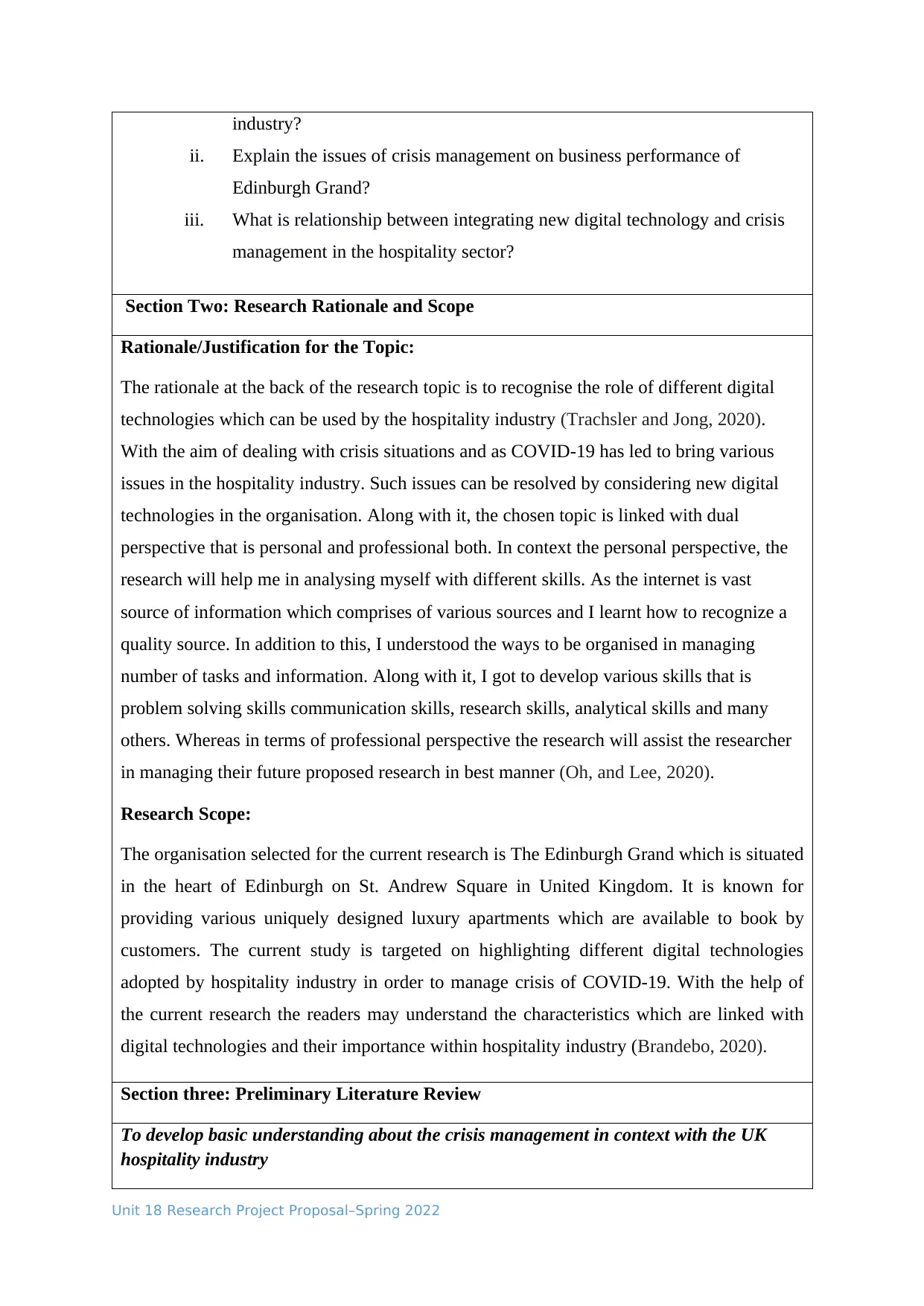
industry?
ii. Explain the issues of crisis management on business performance of
Edinburgh Grand?
iii. What is relationship between integrating new digital technology and crisis
management in the hospitality sector?
Section Two: Research Rationale and Scope
Rationale/Justification for the Topic:
The rationale at the back of the research topic is to recognise the role of different digital
technologies which can be used by the hospitality industry (Trachsler and Jong, 2020).
With the aim of dealing with crisis situations and as COVID-19 has led to bring various
issues in the hospitality industry. Such issues can be resolved by considering new digital
technologies in the organisation. Along with it, the chosen topic is linked with dual
perspective that is personal and professional both. In context the personal perspective, the
research will help me in analysing myself with different skills. As the internet is vast
source of information which comprises of various sources and I learnt how to recognize a
quality source. In addition to this, I understood the ways to be organised in managing
number of tasks and information. Along with it, I got to develop various skills that is
problem solving skills communication skills, research skills, analytical skills and many
others. Whereas in terms of professional perspective the research will assist the researcher
in managing their future proposed research in best manner (Oh, and Lee, 2020).
Research Scope:
The organisation selected for the current research is The Edinburgh Grand which is situated
in the heart of Edinburgh on St. Andrew Square in United Kingdom. It is known for
providing various uniquely designed luxury apartments which are available to book by
customers. The current study is targeted on highlighting different digital technologies
adopted by hospitality industry in order to manage crisis of COVID-19. With the help of
the current research the readers may understand the characteristics which are linked with
digital technologies and their importance within hospitality industry (Brandebo, 2020).
Section three: Preliminary Literature Review
To develop basic understanding about the crisis management in context with the UK
hospitality industry
Unit 18 Research Project Proposal–Spring 2022
ii. Explain the issues of crisis management on business performance of
Edinburgh Grand?
iii. What is relationship between integrating new digital technology and crisis
management in the hospitality sector?
Section Two: Research Rationale and Scope
Rationale/Justification for the Topic:
The rationale at the back of the research topic is to recognise the role of different digital
technologies which can be used by the hospitality industry (Trachsler and Jong, 2020).
With the aim of dealing with crisis situations and as COVID-19 has led to bring various
issues in the hospitality industry. Such issues can be resolved by considering new digital
technologies in the organisation. Along with it, the chosen topic is linked with dual
perspective that is personal and professional both. In context the personal perspective, the
research will help me in analysing myself with different skills. As the internet is vast
source of information which comprises of various sources and I learnt how to recognize a
quality source. In addition to this, I understood the ways to be organised in managing
number of tasks and information. Along with it, I got to develop various skills that is
problem solving skills communication skills, research skills, analytical skills and many
others. Whereas in terms of professional perspective the research will assist the researcher
in managing their future proposed research in best manner (Oh, and Lee, 2020).
Research Scope:
The organisation selected for the current research is The Edinburgh Grand which is situated
in the heart of Edinburgh on St. Andrew Square in United Kingdom. It is known for
providing various uniquely designed luxury apartments which are available to book by
customers. The current study is targeted on highlighting different digital technologies
adopted by hospitality industry in order to manage crisis of COVID-19. With the help of
the current research the readers may understand the characteristics which are linked with
digital technologies and their importance within hospitality industry (Brandebo, 2020).
Section three: Preliminary Literature Review
To develop basic understanding about the crisis management in context with the UK
hospitality industry
Unit 18 Research Project Proposal–Spring 2022
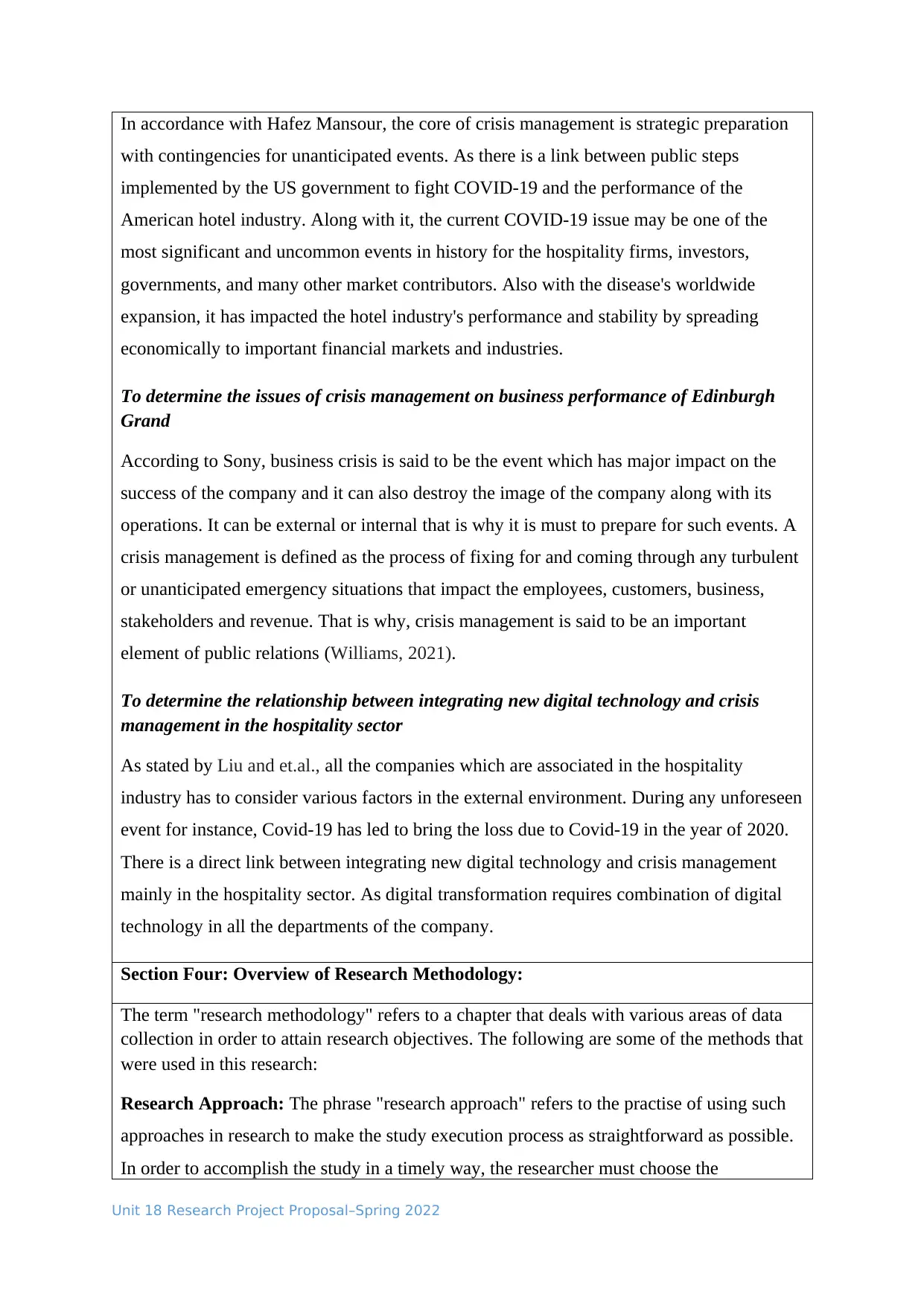
In accordance with Hafez Mansour, the core of crisis management is strategic preparation
with contingencies for unanticipated events. As there is a link between public steps
implemented by the US government to fight COVID-19 and the performance of the
American hotel industry. Along with it, the current COVID-19 issue may be one of the
most significant and uncommon events in history for the hospitality firms, investors,
governments, and many other market contributors. Also with the disease's worldwide
expansion, it has impacted the hotel industry's performance and stability by spreading
economically to important financial markets and industries.
To determine the issues of crisis management on business performance of Edinburgh
Grand
According to Sony, business crisis is said to be the event which has major impact on the
success of the company and it can also destroy the image of the company along with its
operations. It can be external or internal that is why it is must to prepare for such events. A
crisis management is defined as the process of fixing for and coming through any turbulent
or unanticipated emergency situations that impact the employees, customers, business,
stakeholders and revenue. That is why, crisis management is said to be an important
element of public relations (Williams, 2021).
To determine the relationship between integrating new digital technology and crisis
management in the hospitality sector
As stated by Liu and et.al., all the companies which are associated in the hospitality
industry has to consider various factors in the external environment. During any unforeseen
event for instance, Covid-19 has led to bring the loss due to Covid-19 in the year of 2020.
There is a direct link between integrating new digital technology and crisis management
mainly in the hospitality sector. As digital transformation requires combination of digital
technology in all the departments of the company.
Section Four: Overview of Research Methodology:
The term "research methodology" refers to a chapter that deals with various areas of data
collection in order to attain research objectives. The following are some of the methods that
were used in this research:
Research Approach: The phrase "research approach" refers to the practise of using such
approaches in research to make the study execution process as straightforward as possible.
In order to accomplish the study in a timely way, the researcher must choose the
Unit 18 Research Project Proposal–Spring 2022
with contingencies for unanticipated events. As there is a link between public steps
implemented by the US government to fight COVID-19 and the performance of the
American hotel industry. Along with it, the current COVID-19 issue may be one of the
most significant and uncommon events in history for the hospitality firms, investors,
governments, and many other market contributors. Also with the disease's worldwide
expansion, it has impacted the hotel industry's performance and stability by spreading
economically to important financial markets and industries.
To determine the issues of crisis management on business performance of Edinburgh
Grand
According to Sony, business crisis is said to be the event which has major impact on the
success of the company and it can also destroy the image of the company along with its
operations. It can be external or internal that is why it is must to prepare for such events. A
crisis management is defined as the process of fixing for and coming through any turbulent
or unanticipated emergency situations that impact the employees, customers, business,
stakeholders and revenue. That is why, crisis management is said to be an important
element of public relations (Williams, 2021).
To determine the relationship between integrating new digital technology and crisis
management in the hospitality sector
As stated by Liu and et.al., all the companies which are associated in the hospitality
industry has to consider various factors in the external environment. During any unforeseen
event for instance, Covid-19 has led to bring the loss due to Covid-19 in the year of 2020.
There is a direct link between integrating new digital technology and crisis management
mainly in the hospitality sector. As digital transformation requires combination of digital
technology in all the departments of the company.
Section Four: Overview of Research Methodology:
The term "research methodology" refers to a chapter that deals with various areas of data
collection in order to attain research objectives. The following are some of the methods that
were used in this research:
Research Approach: The phrase "research approach" refers to the practise of using such
approaches in research to make the study execution process as straightforward as possible.
In order to accomplish the study in a timely way, the researcher must choose the
Unit 18 Research Project Proposal–Spring 2022
⊘ This is a preview!⊘
Do you want full access?
Subscribe today to unlock all pages.

Trusted by 1+ million students worldwide
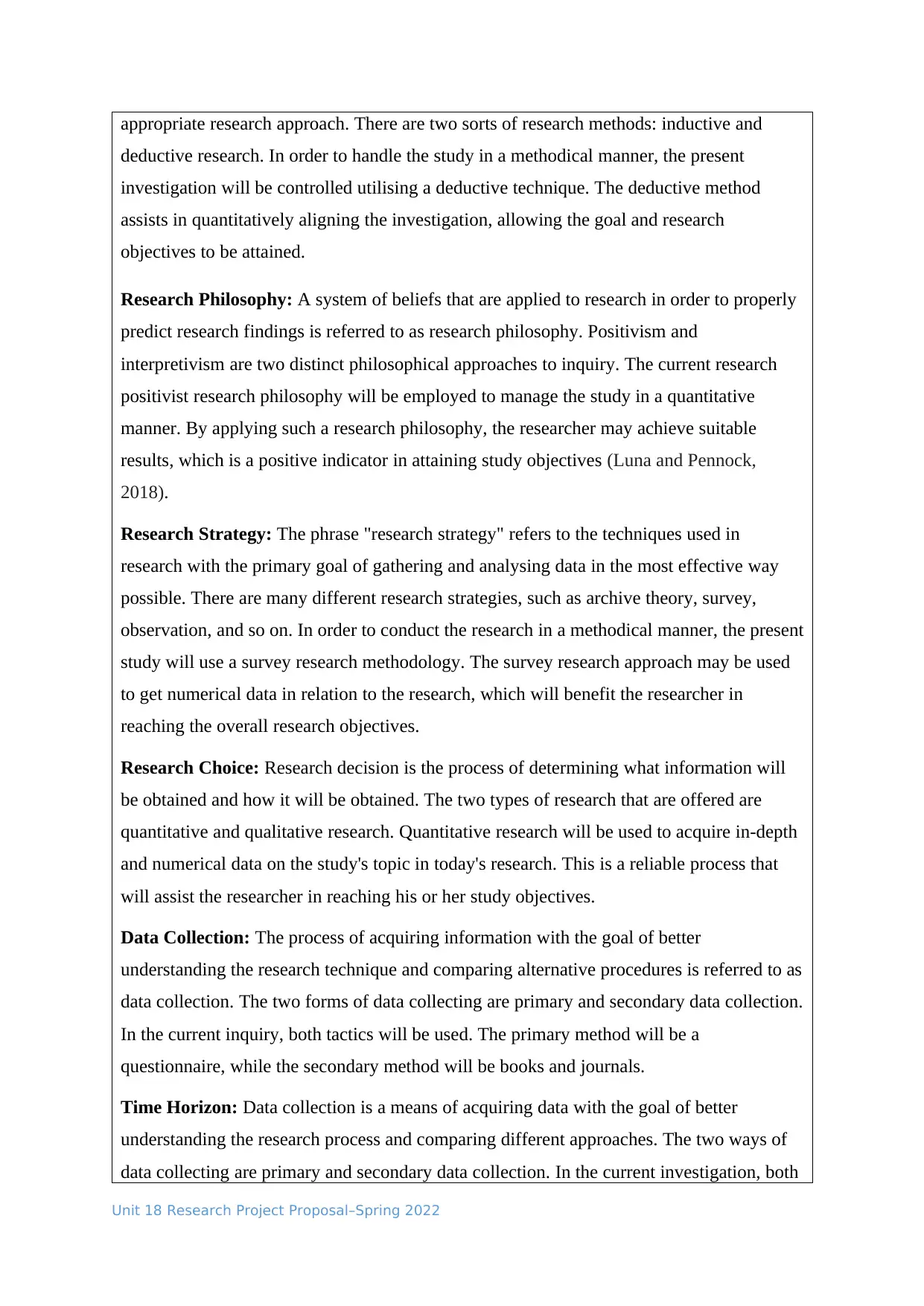
appropriate research approach. There are two sorts of research methods: inductive and
deductive research. In order to handle the study in a methodical manner, the present
investigation will be controlled utilising a deductive technique. The deductive method
assists in quantitatively aligning the investigation, allowing the goal and research
objectives to be attained.
Research Philosophy: A system of beliefs that are applied to research in order to properly
predict research findings is referred to as research philosophy. Positivism and
interpretivism are two distinct philosophical approaches to inquiry. The current research
positivist research philosophy will be employed to manage the study in a quantitative
manner. By applying such a research philosophy, the researcher may achieve suitable
results, which is a positive indicator in attaining study objectives (Luna and Pennock,
2018).
Research Strategy: The phrase "research strategy" refers to the techniques used in
research with the primary goal of gathering and analysing data in the most effective way
possible. There are many different research strategies, such as archive theory, survey,
observation, and so on. In order to conduct the research in a methodical manner, the present
study will use a survey research methodology. The survey research approach may be used
to get numerical data in relation to the research, which will benefit the researcher in
reaching the overall research objectives.
Research Choice: Research decision is the process of determining what information will
be obtained and how it will be obtained. The two types of research that are offered are
quantitative and qualitative research. Quantitative research will be used to acquire in-depth
and numerical data on the study's topic in today's research. This is a reliable process that
will assist the researcher in reaching his or her study objectives.
Data Collection: The process of acquiring information with the goal of better
understanding the research technique and comparing alternative procedures is referred to as
data collection. The two forms of data collecting are primary and secondary data collection.
In the current inquiry, both tactics will be used. The primary method will be a
questionnaire, while the secondary method will be books and journals.
Time Horizon: Data collection is a means of acquiring data with the goal of better
understanding the research process and comparing different approaches. The two ways of
data collecting are primary and secondary data collection. In the current investigation, both
Unit 18 Research Project Proposal–Spring 2022
deductive research. In order to handle the study in a methodical manner, the present
investigation will be controlled utilising a deductive technique. The deductive method
assists in quantitatively aligning the investigation, allowing the goal and research
objectives to be attained.
Research Philosophy: A system of beliefs that are applied to research in order to properly
predict research findings is referred to as research philosophy. Positivism and
interpretivism are two distinct philosophical approaches to inquiry. The current research
positivist research philosophy will be employed to manage the study in a quantitative
manner. By applying such a research philosophy, the researcher may achieve suitable
results, which is a positive indicator in attaining study objectives (Luna and Pennock,
2018).
Research Strategy: The phrase "research strategy" refers to the techniques used in
research with the primary goal of gathering and analysing data in the most effective way
possible. There are many different research strategies, such as archive theory, survey,
observation, and so on. In order to conduct the research in a methodical manner, the present
study will use a survey research methodology. The survey research approach may be used
to get numerical data in relation to the research, which will benefit the researcher in
reaching the overall research objectives.
Research Choice: Research decision is the process of determining what information will
be obtained and how it will be obtained. The two types of research that are offered are
quantitative and qualitative research. Quantitative research will be used to acquire in-depth
and numerical data on the study's topic in today's research. This is a reliable process that
will assist the researcher in reaching his or her study objectives.
Data Collection: The process of acquiring information with the goal of better
understanding the research technique and comparing alternative procedures is referred to as
data collection. The two forms of data collecting are primary and secondary data collection.
In the current inquiry, both tactics will be used. The primary method will be a
questionnaire, while the secondary method will be books and journals.
Time Horizon: Data collection is a means of acquiring data with the goal of better
understanding the research process and comparing different approaches. The two ways of
data collecting are primary and secondary data collection. In the current investigation, both
Unit 18 Research Project Proposal–Spring 2022
Paraphrase This Document
Need a fresh take? Get an instant paraphrase of this document with our AI Paraphraser
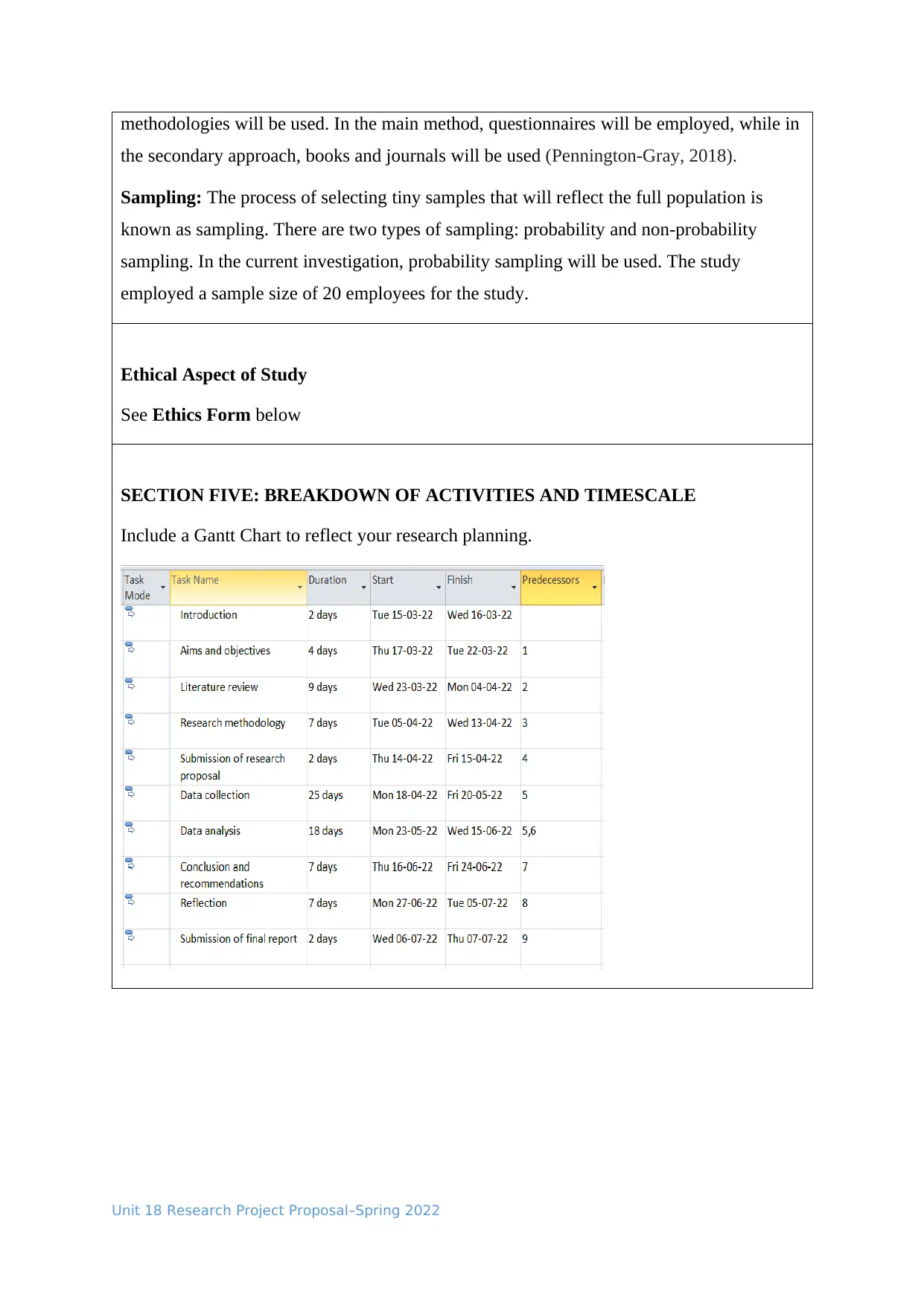
methodologies will be used. In the main method, questionnaires will be employed, while in
the secondary approach, books and journals will be used (Pennington-Gray, 2018).
Sampling: The process of selecting tiny samples that will reflect the full population is
known as sampling. There are two types of sampling: probability and non-probability
sampling. In the current investigation, probability sampling will be used. The study
employed a sample size of 20 employees for the study.
Ethical Aspect of Study
See Ethics Form below
SECTION FIVE: BREAKDOWN OF ACTIVITIES AND TIMESCALE
Include a Gantt Chart to reflect your research planning.
Unit 18 Research Project Proposal–Spring 2022
the secondary approach, books and journals will be used (Pennington-Gray, 2018).
Sampling: The process of selecting tiny samples that will reflect the full population is
known as sampling. There are two types of sampling: probability and non-probability
sampling. In the current investigation, probability sampling will be used. The study
employed a sample size of 20 employees for the study.
Ethical Aspect of Study
See Ethics Form below
SECTION FIVE: BREAKDOWN OF ACTIVITIES AND TIMESCALE
Include a Gantt Chart to reflect your research planning.
Unit 18 Research Project Proposal–Spring 2022
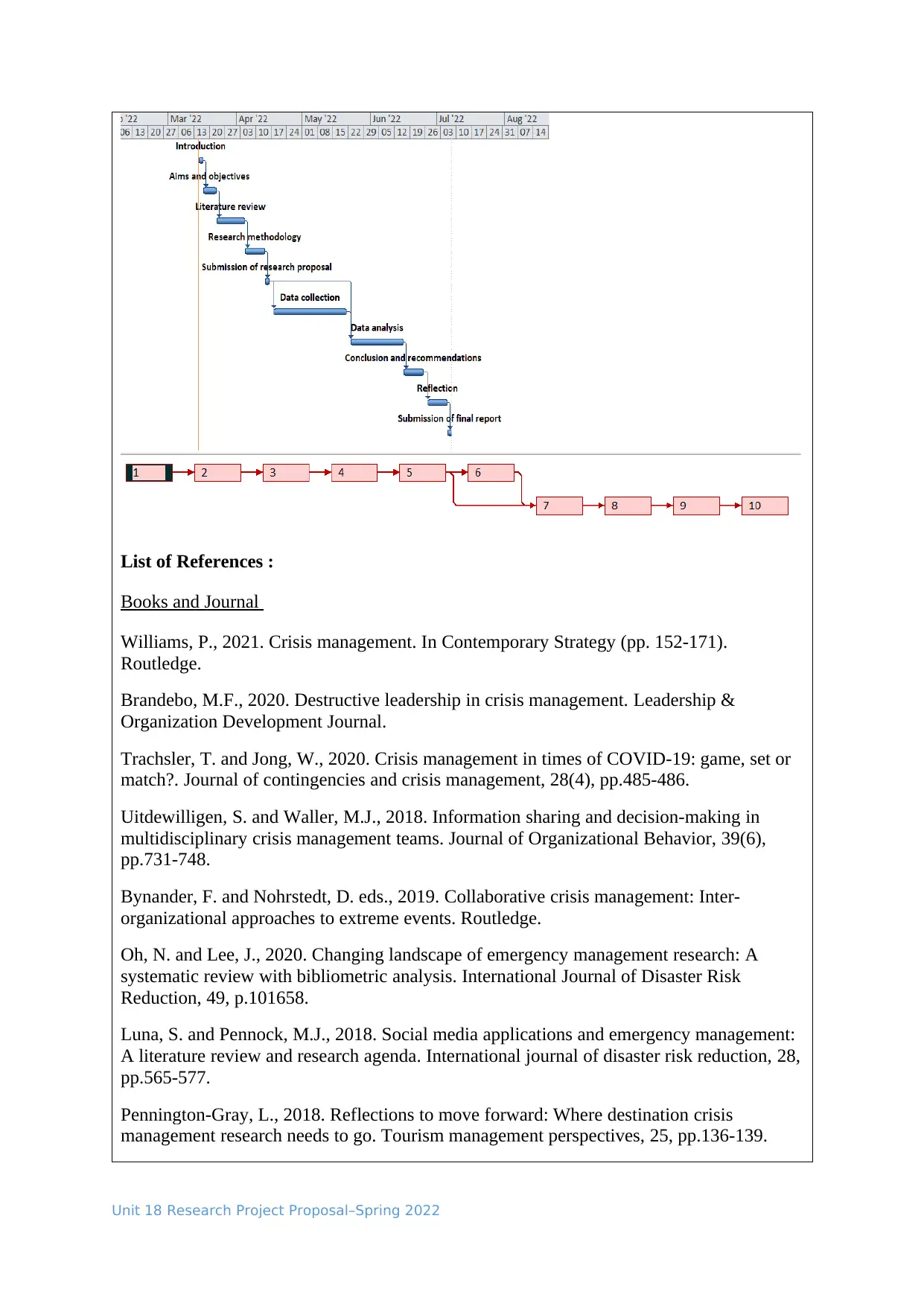
List of References :
Books and Journal
Williams, P., 2021. Crisis management. In Contemporary Strategy (pp. 152-171).
Routledge.
Brandebo, M.F., 2020. Destructive leadership in crisis management. Leadership &
Organization Development Journal.
Trachsler, T. and Jong, W., 2020. Crisis management in times of COVID‐19: game, set or
match?. Journal of contingencies and crisis management, 28(4), pp.485-486.
Uitdewilligen, S. and Waller, M.J., 2018. Information sharing and decision‐making in
multidisciplinary crisis management teams. Journal of Organizational Behavior, 39(6),
pp.731-748.
Bynander, F. and Nohrstedt, D. eds., 2019. Collaborative crisis management: Inter-
organizational approaches to extreme events. Routledge.
Oh, N. and Lee, J., 2020. Changing landscape of emergency management research: A
systematic review with bibliometric analysis. International Journal of Disaster Risk
Reduction, 49, p.101658.
Luna, S. and Pennock, M.J., 2018. Social media applications and emergency management:
A literature review and research agenda. International journal of disaster risk reduction, 28,
pp.565-577.
Pennington-Gray, L., 2018. Reflections to move forward: Where destination crisis
management research needs to go. Tourism management perspectives, 25, pp.136-139.
Unit 18 Research Project Proposal–Spring 2022
Books and Journal
Williams, P., 2021. Crisis management. In Contemporary Strategy (pp. 152-171).
Routledge.
Brandebo, M.F., 2020. Destructive leadership in crisis management. Leadership &
Organization Development Journal.
Trachsler, T. and Jong, W., 2020. Crisis management in times of COVID‐19: game, set or
match?. Journal of contingencies and crisis management, 28(4), pp.485-486.
Uitdewilligen, S. and Waller, M.J., 2018. Information sharing and decision‐making in
multidisciplinary crisis management teams. Journal of Organizational Behavior, 39(6),
pp.731-748.
Bynander, F. and Nohrstedt, D. eds., 2019. Collaborative crisis management: Inter-
organizational approaches to extreme events. Routledge.
Oh, N. and Lee, J., 2020. Changing landscape of emergency management research: A
systematic review with bibliometric analysis. International Journal of Disaster Risk
Reduction, 49, p.101658.
Luna, S. and Pennock, M.J., 2018. Social media applications and emergency management:
A literature review and research agenda. International journal of disaster risk reduction, 28,
pp.565-577.
Pennington-Gray, L., 2018. Reflections to move forward: Where destination crisis
management research needs to go. Tourism management perspectives, 25, pp.136-139.
Unit 18 Research Project Proposal–Spring 2022
⊘ This is a preview!⊘
Do you want full access?
Subscribe today to unlock all pages.

Trusted by 1+ million students worldwide
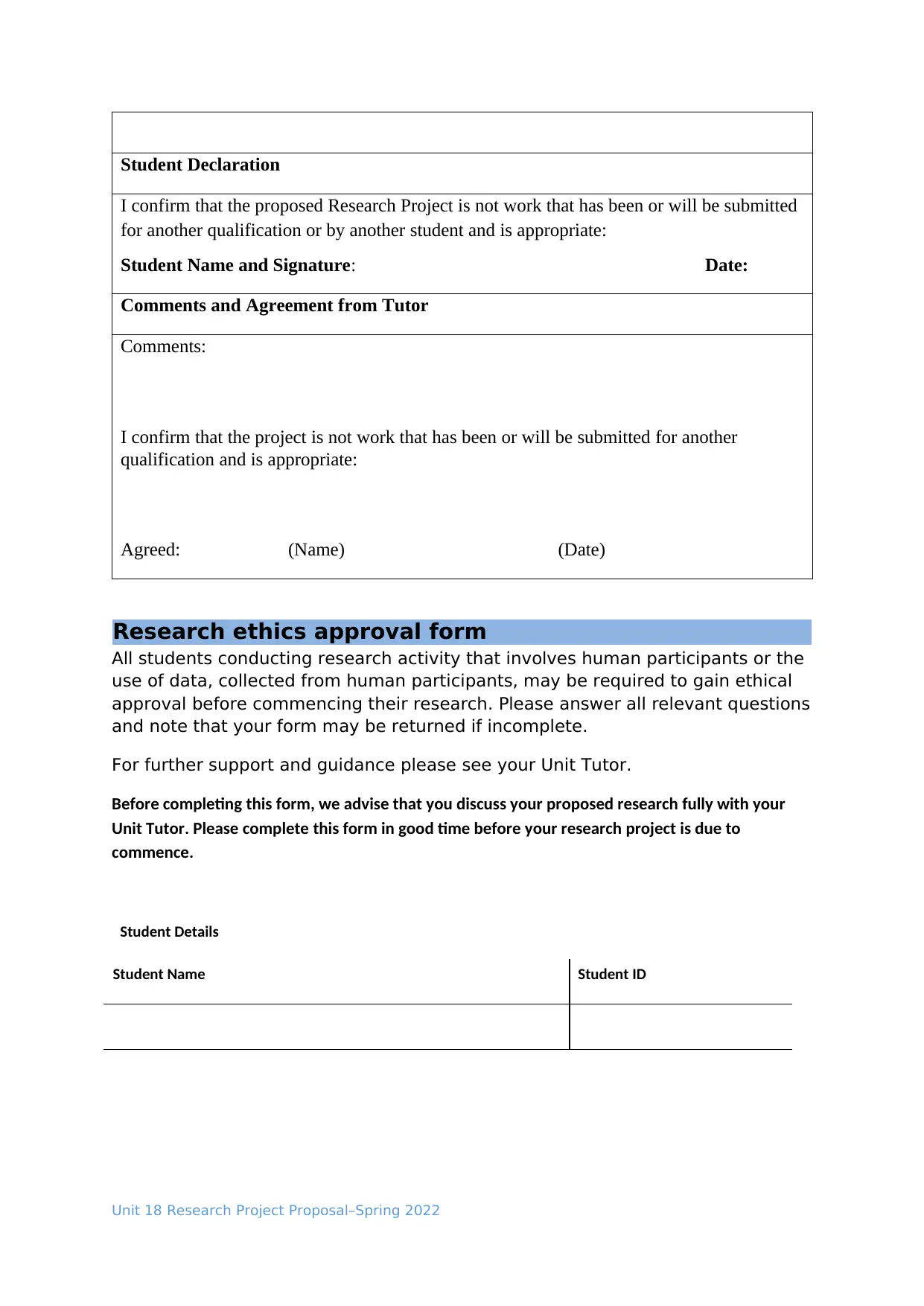
Student Declaration
I confirm that the proposed Research Project is not work that has been or will be submitted
for another qualification or by another student and is appropriate:
Student Name and Signature: Date:
Comments and Agreement from Tutor
Comments:
I confirm that the project is not work that has been or will be submitted for another
qualification and is appropriate:
Agreed: (Name) (Date)
Research ethics approval form
All students conducting research activity that involves human participants or the
use of data, collected from human participants, may be required to gain ethical
approval before commencing their research. Please answer all relevant questions
and note that your form may be returned if incomplete.
For further support and guidance please see your Unit Tutor.
Before completing this form, we advise that you discuss your proposed research fully with your
Unit Tutor. Please complete this form in good time before your research project is due to
commence.
Student Details
Student Name Student ID
Unit 18 Research Project Proposal–Spring 2022
I confirm that the proposed Research Project is not work that has been or will be submitted
for another qualification or by another student and is appropriate:
Student Name and Signature: Date:
Comments and Agreement from Tutor
Comments:
I confirm that the project is not work that has been or will be submitted for another
qualification and is appropriate:
Agreed: (Name) (Date)
Research ethics approval form
All students conducting research activity that involves human participants or the
use of data, collected from human participants, may be required to gain ethical
approval before commencing their research. Please answer all relevant questions
and note that your form may be returned if incomplete.
For further support and guidance please see your Unit Tutor.
Before completing this form, we advise that you discuss your proposed research fully with your
Unit Tutor. Please complete this form in good time before your research project is due to
commence.
Student Details
Student Name Student ID
Unit 18 Research Project Proposal–Spring 2022
Paraphrase This Document
Need a fresh take? Get an instant paraphrase of this document with our AI Paraphraser
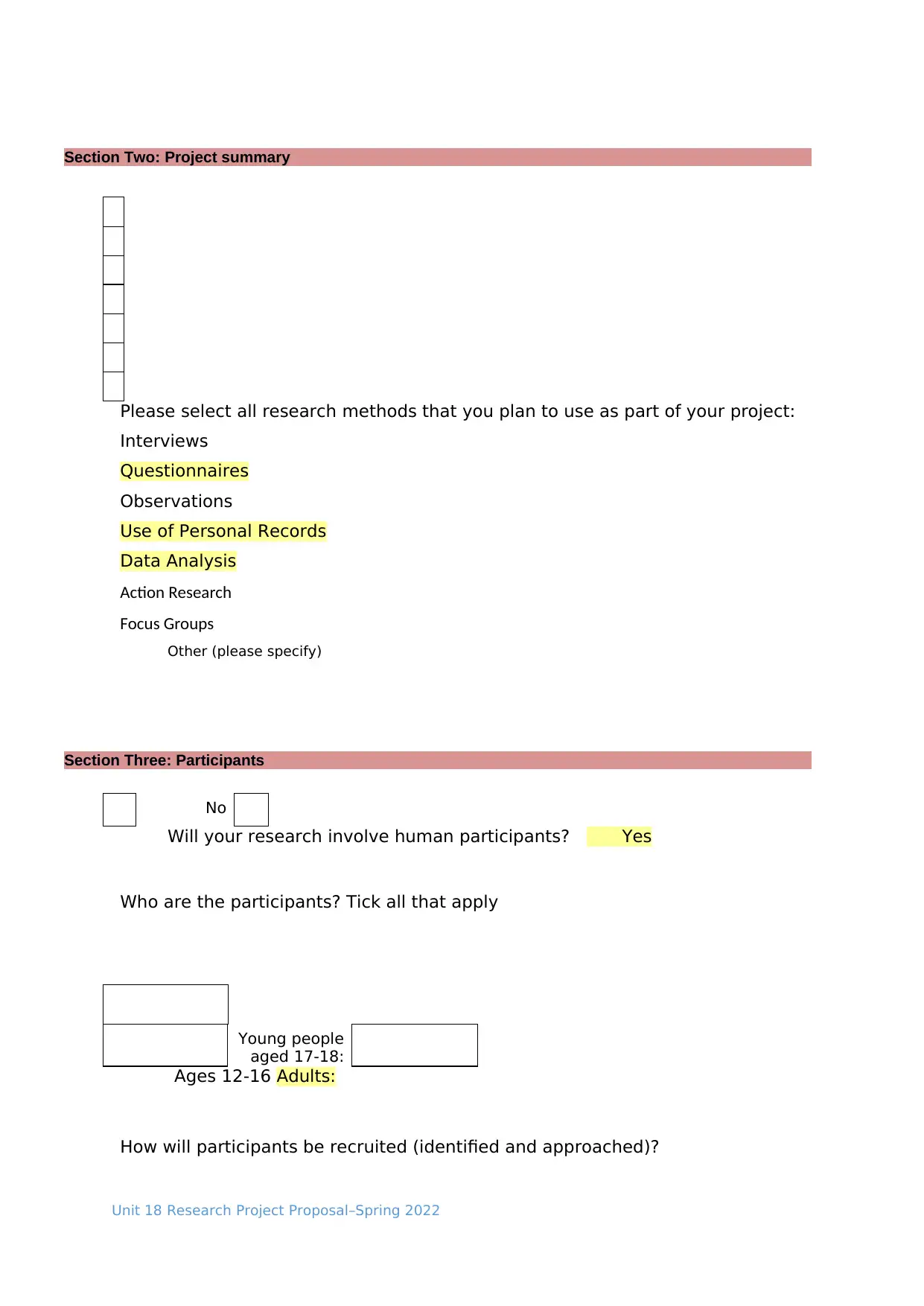
Section Two: Project summary
Please select all research methods that you plan to use as part of your project:
Interviews
Questionnaires
Observations
Use of Personal Records
Data Analysis
Action Research
Focus Groups
Other (please specify)
Section Three: Participants
No
Will your research involve human participants? Yes
Who are the participants? Tick all that apply
Young people
aged 17-18:
Ages 12-16 Adults:
How will participants be recruited (identified and approached)?
Unit 18 Research Project Proposal–Spring 2022
Please select all research methods that you plan to use as part of your project:
Interviews
Questionnaires
Observations
Use of Personal Records
Data Analysis
Action Research
Focus Groups
Other (please specify)
Section Three: Participants
No
Will your research involve human participants? Yes
Who are the participants? Tick all that apply
Young people
aged 17-18:
Ages 12-16 Adults:
How will participants be recruited (identified and approached)?
Unit 18 Research Project Proposal–Spring 2022
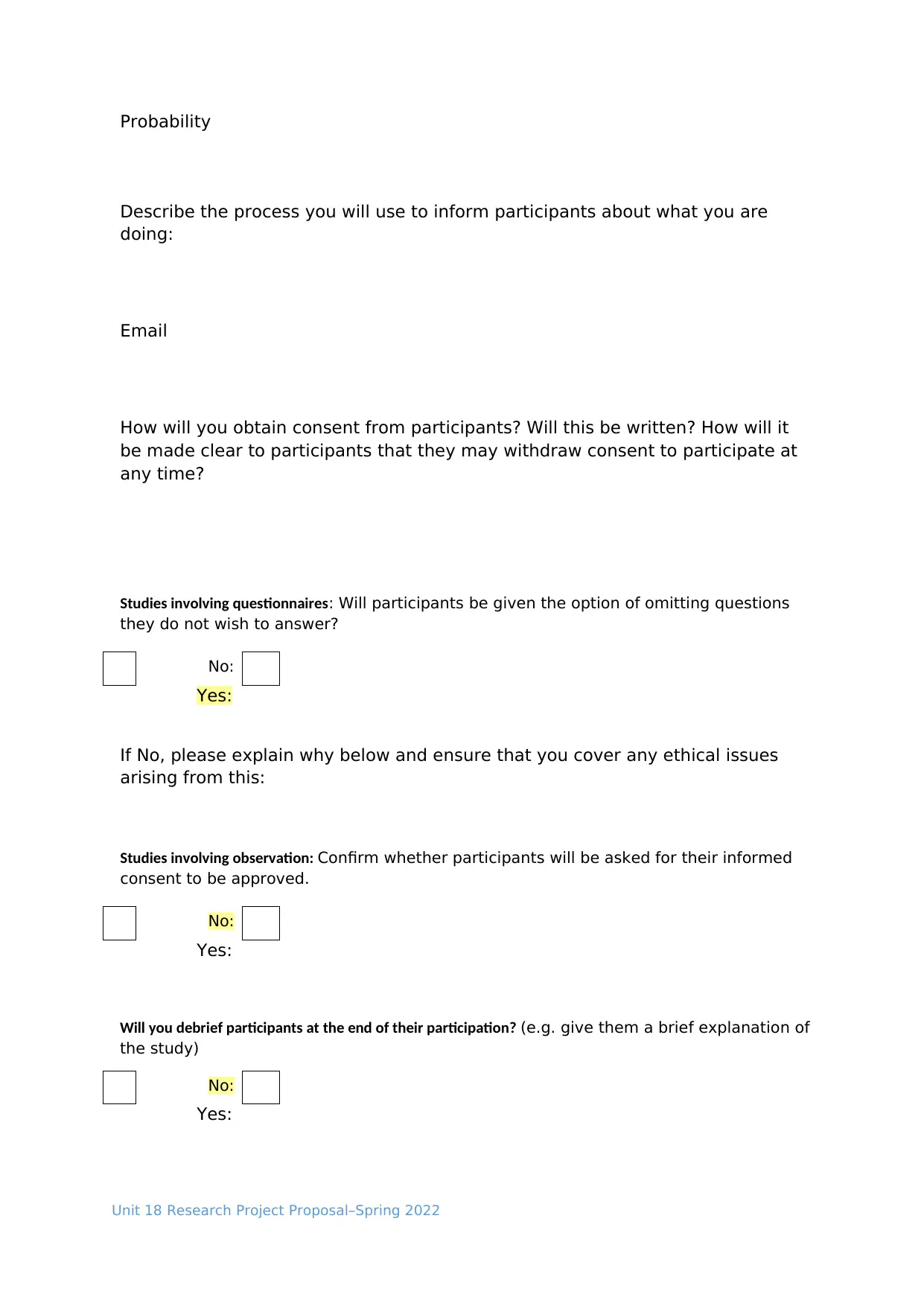
Probability
Describe the process you will use to inform participants about what you are
doing:
Email
How will you obtain consent from participants? Will this be written? How will it
be made clear to participants that they may withdraw consent to participate at
any time?
Studies involving questionnaires: Will participants be given the option of omitting questions
they do not wish to answer?
No:
Yes:
If No, please explain why below and ensure that you cover any ethical issues
arising from this:
Studies involving observation: Confirm whether participants will be asked for their informed
consent to be approved.
No:
Yes:
Will you debrief participants at the end of their participation? (e.g. give them a brief explanation of
the study)
No:
Yes:
Unit 18 Research Project Proposal–Spring 2022
Describe the process you will use to inform participants about what you are
doing:
How will you obtain consent from participants? Will this be written? How will it
be made clear to participants that they may withdraw consent to participate at
any time?
Studies involving questionnaires: Will participants be given the option of omitting questions
they do not wish to answer?
No:
Yes:
If No, please explain why below and ensure that you cover any ethical issues
arising from this:
Studies involving observation: Confirm whether participants will be asked for their informed
consent to be approved.
No:
Yes:
Will you debrief participants at the end of their participation? (e.g. give them a brief explanation of
the study)
No:
Yes:
Unit 18 Research Project Proposal–Spring 2022
⊘ This is a preview!⊘
Do you want full access?
Subscribe today to unlock all pages.

Trusted by 1+ million students worldwide
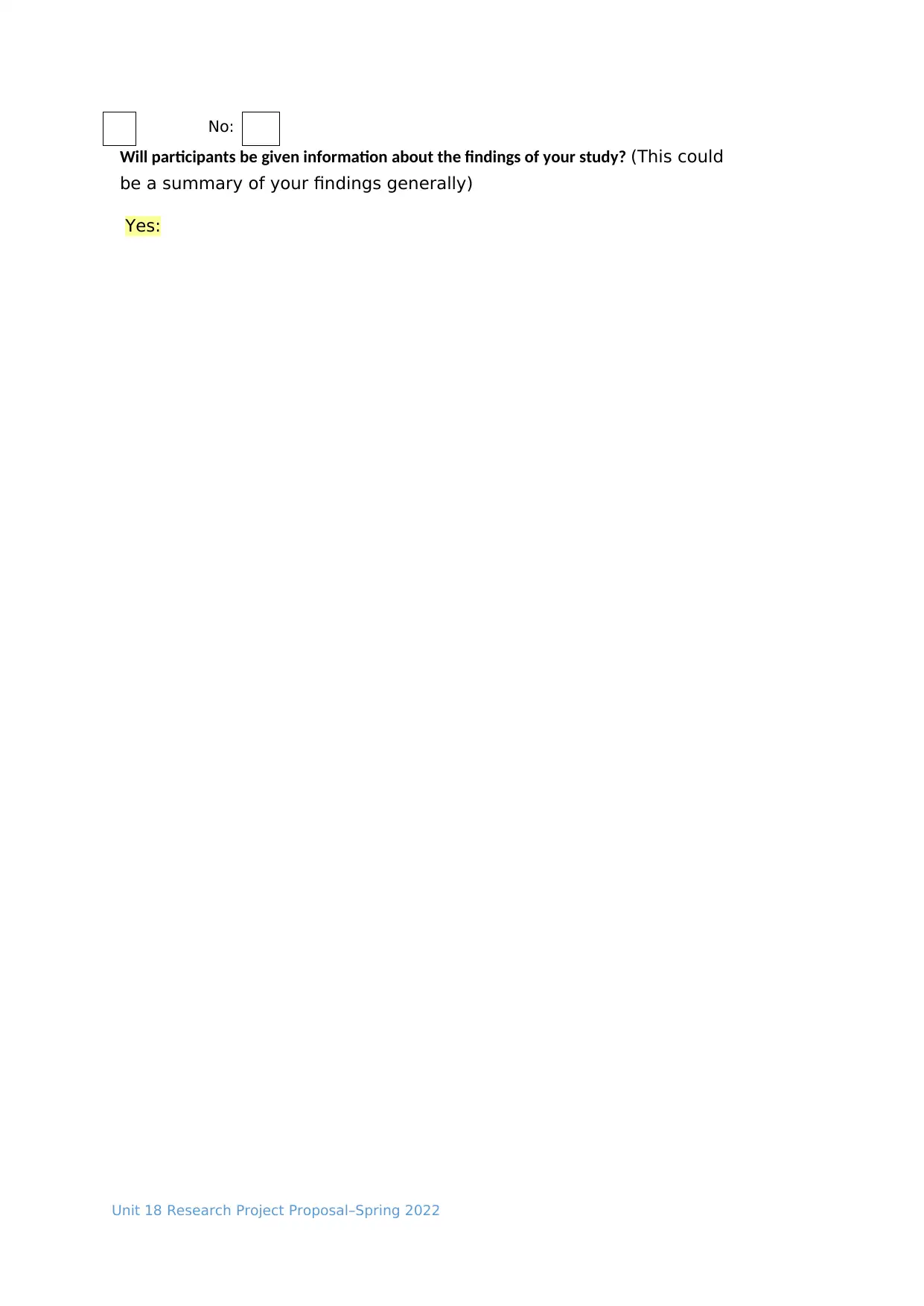
No:
Will participants be given information about the findings of your study? (This could
be a summary of your findings generally)
Yes:
Unit 18 Research Project Proposal–Spring 2022
Will participants be given information about the findings of your study? (This could
be a summary of your findings generally)
Yes:
Unit 18 Research Project Proposal–Spring 2022
Paraphrase This Document
Need a fresh take? Get an instant paraphrase of this document with our AI Paraphraser
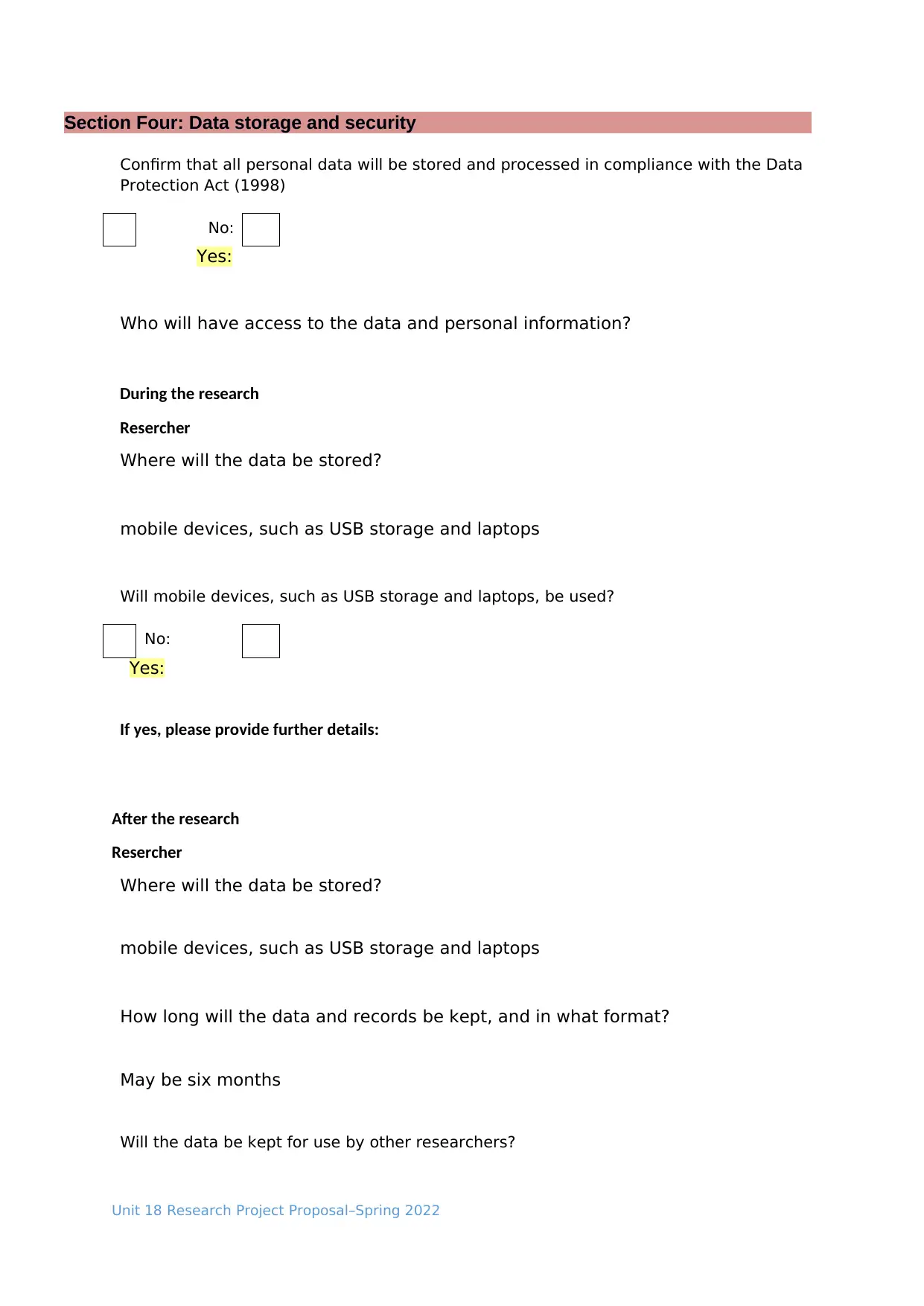
Section Four: Data storage and security
Confirm that all personal data will be stored and processed in compliance with the Data
Protection Act (1998)
No:
Yes:
Who will have access to the data and personal information?
During the research
Resercher
Where will the data be stored?
mobile devices, such as USB storage and laptops
Will mobile devices, such as USB storage and laptops, be used?
No:
Yes:
If yes, please provide further details:
After the research
Resercher
Where will the data be stored?
mobile devices, such as USB storage and laptops
How long will the data and records be kept, and in what format?
May be six months
Will the data be kept for use by other researchers?
Unit 18 Research Project Proposal–Spring 2022
Confirm that all personal data will be stored and processed in compliance with the Data
Protection Act (1998)
No:
Yes:
Who will have access to the data and personal information?
During the research
Resercher
Where will the data be stored?
mobile devices, such as USB storage and laptops
Will mobile devices, such as USB storage and laptops, be used?
No:
Yes:
If yes, please provide further details:
After the research
Resercher
Where will the data be stored?
mobile devices, such as USB storage and laptops
How long will the data and records be kept, and in what format?
May be six months
Will the data be kept for use by other researchers?
Unit 18 Research Project Proposal–Spring 2022
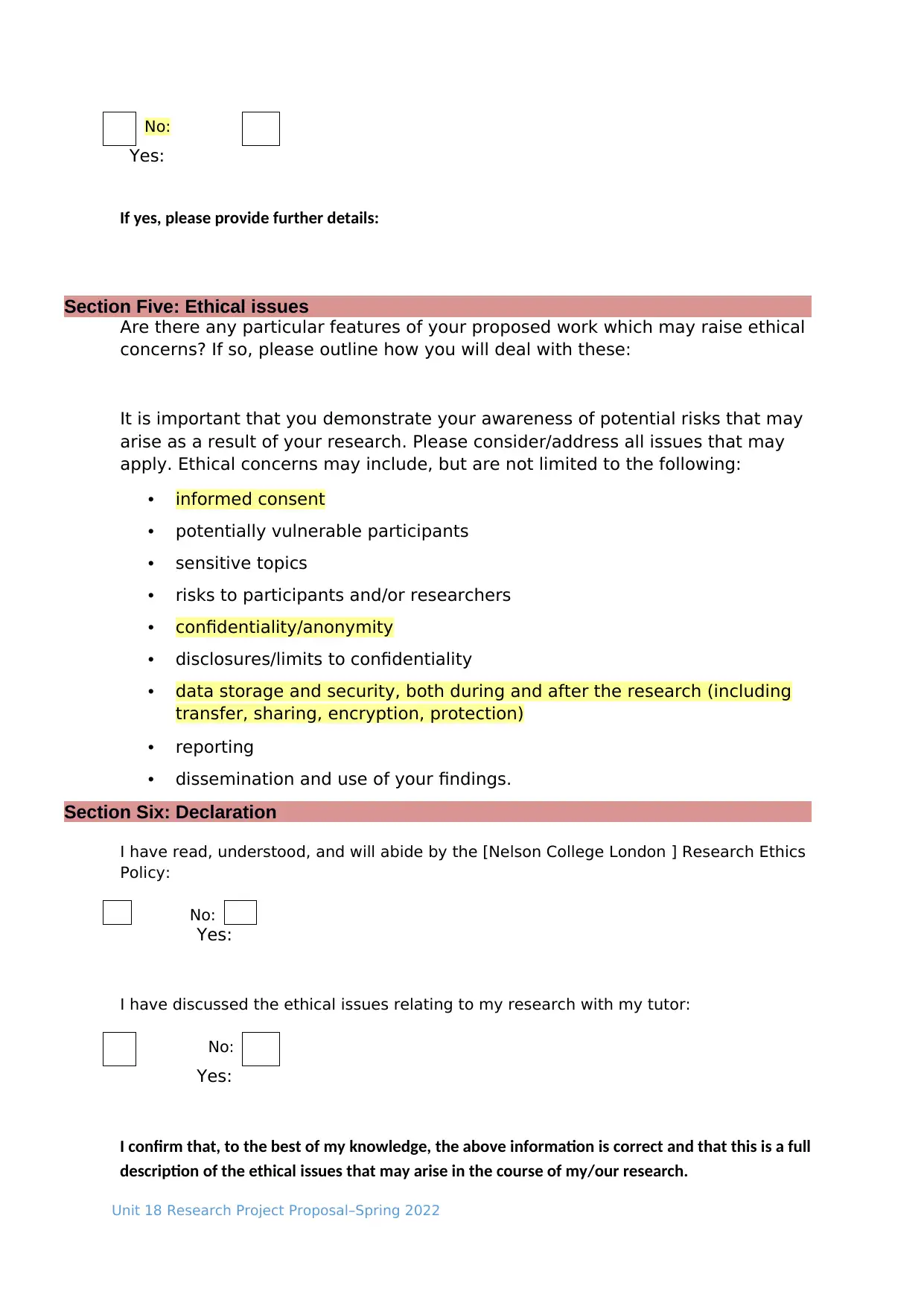
No:
Yes:
If yes, please provide further details:
Section Five: Ethical issues
Are there any particular features of your proposed work which may raise ethical
concerns? If so, please outline how you will deal with these:
It is important that you demonstrate your awareness of potential risks that may
arise as a result of your research. Please consider/address all issues that may
apply. Ethical concerns may include, but are not limited to the following:
• informed consent
• potentially vulnerable participants
• sensitive topics
• risks to participants and/or researchers
• confidentiality/anonymity
• disclosures/limits to confidentiality
• data storage and security, both during and after the research (including
transfer, sharing, encryption, protection)
• reporting
• dissemination and use of your findings.
Section Six: Declaration
I have read, understood, and will abide by the [Nelson College London ] Research Ethics
Policy:
No:
Yes:
I have discussed the ethical issues relating to my research with my tutor:
No:
Yes:
I confirm that, to the best of my knowledge, the above information is correct and that this is a full
description of the ethical issues that may arise in the course of my/our research.
Unit 18 Research Project Proposal–Spring 2022
Yes:
If yes, please provide further details:
Section Five: Ethical issues
Are there any particular features of your proposed work which may raise ethical
concerns? If so, please outline how you will deal with these:
It is important that you demonstrate your awareness of potential risks that may
arise as a result of your research. Please consider/address all issues that may
apply. Ethical concerns may include, but are not limited to the following:
• informed consent
• potentially vulnerable participants
• sensitive topics
• risks to participants and/or researchers
• confidentiality/anonymity
• disclosures/limits to confidentiality
• data storage and security, both during and after the research (including
transfer, sharing, encryption, protection)
• reporting
• dissemination and use of your findings.
Section Six: Declaration
I have read, understood, and will abide by the [Nelson College London ] Research Ethics
Policy:
No:
Yes:
I have discussed the ethical issues relating to my research with my tutor:
No:
Yes:
I confirm that, to the best of my knowledge, the above information is correct and that this is a full
description of the ethical issues that may arise in the course of my/our research.
Unit 18 Research Project Proposal–Spring 2022
⊘ This is a preview!⊘
Do you want full access?
Subscribe today to unlock all pages.

Trusted by 1+ million students worldwide
1 out of 13
Related Documents
Your All-in-One AI-Powered Toolkit for Academic Success.
+13062052269
info@desklib.com
Available 24*7 on WhatsApp / Email
![[object Object]](/_next/static/media/star-bottom.7253800d.svg)
Unlock your academic potential
Copyright © 2020–2026 A2Z Services. All Rights Reserved. Developed and managed by ZUCOL.




